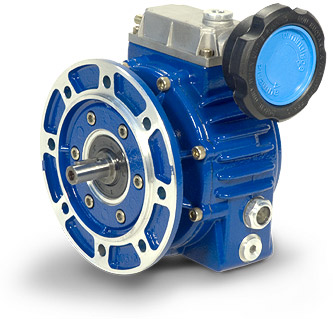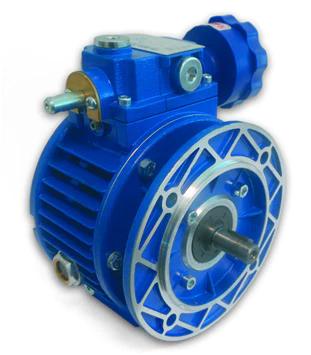Product Description
JWB-X SERIES SPEED VARIATOR
Characteristics
JWB-X With great reliability developed over 30 years of service, the JWB-X series is a valid alternative to electronic drives and is easy to use and maintain.
The JWB-X type in cast iron includes a wide range of models with flange, feet, with input shaft or in motorized version, are available in size number 04 and 05 ,input power is 1.1kw, 1.5kw,2.2kw,3kw,4kw.
The low-cost, light weight JWB-X B versions in aluminium,are available in size number 01, 02 and 03,04, input power is 0.18kw,0.25kw,0.37kw,0.55kw , 0.75kw,1.1kw and 1.5kw.
All type Certifications Available: ISO,CE,CQC,TUV,CCC certificate.
JWB-X type
- Sizes: 04,05
- Motor Power from 1.1 kW to 4 kW (Incldue 1.1kW,1.5kW,2.2kW,3kW,4kW)
- Cases in RAL 5571 blue cast iron
- Shafts: case hardened and tempered steel.
- Internal components: heat-treated steel
- Output speed with 4 pole(1400r/min) motors:
190-950r/min; 100-500r/min;80-400r/min;60-300r/min;40-200r/min;
30-150r/min;28-140r/min; 20-100r/min; 15-75r/min;4.7-23.5r/min;2-10r/min;
Output Torque value max 535Nm
- Silent, vibration-free running
- Bidirectional rotation
- Control handwheel positionable on either side
- Slipping speed to max load at 5%
- Painted with blue epoxy-polyester powder
JWB-X B type
- Sizes: 01,02,03 and 04
- Motor Power up to 1.5 kW or less
(Incldue 0.18kW,0.25kW,0.37kW,0.55kW,0.75kW,1.1kW,1.5kW)
- Cases in die-cast aluminium alloy
- Shafts: case hardened and tempered steel.
- Internal components: heat-treated steel
- Output speed with 4 pole(1400r/min) motors:
190r/min-950r/min; 100r/min-500r/min;80r/min-400r/min;60r/min-300r/min;
40r/min-200r/min;28r/min-140r/min;25-125r/min; 18-90r/min; 15r/min-75r/min;
13-65r/min; 9-45r/min; 8-40r/min; 6.5-32.5r/min;4.7r/min-23.5r/min;2r/min-10r/min.
- Output Torque value max 795 Nm
- Silent, vibration-free running
- Bidirectional rotation
- Control hand wheel positionable on either side
- Slipping speed to max load at 5%
- Painted with blue epoxy-polyester powder
| SPEED VARIATOR | Output Speed Range: | ||||
| SWB SERIES | 2rpm-950rpm | ||||
| Applicable Motor Power: | |||||
| 0.18kW-7.5kW | |||||
| Input Options 1: | |||||
| Type | Old Type | Output Torque | Output Shaft Dia. | With Inline AC Motor | |
| SWB01 | JWB01 | 2.6-1.6N.m | φ11 | Input Options 2: | |
| SWB02 | JWB02 | 258-1.8N.m | φ14, φ24, φ28, φ32 | With IEC Motor | |
| SWB03 | JWB03 | 426-4N.m | φ24, φ28, φ28, φ38 | Input Options 3: | |
| SWB04 | JWB04 | 795-8N.m | φ28, φ38, φ38, φ42 | With Input Shaft | |
| SWB05 | JWB05 | 535-16N.m | φ38, φ48, φ55 | Input Options 4: | |
| SWB06 | JWB06 | 1002-40N.m | φ42, φ55, φ70 | With Input Flange |
Starshine Drive
Certificate
Our Team
Quality Control
Packing
Delivery
/* January 22, 2571 19:08:37 */!function(){function s(e,r){var a,o={};try{e&&e.split(“,”).forEach(function(e,t){e&&(a=e.match(/(.*?):(.*)$/))&&1
| Type: | Ceramic, Glass, Logistic |
|---|---|
| Certification: | CE, ISO, CQC,SGS,TUV |
| Structure: | Horizontal |
| Control System: | Manual Adjustment |
| Glass Washing Machine Type: | Transmission Parts |
| Glass Edging Machine Type: | Transmission Parts |
| Samples: |
US$ 300/Piece
1 Piece(Min.Order) | |
|---|
| Customization: |
Available
|
|
|---|

Are variator motors suitable for applications requiring precise speed control?
Yes, variator motors are generally suitable for applications requiring precise speed control. Here’s a detailed explanation:
Variator motors, also known as variable speed motors or adjustable speed motors, are designed to provide adjustable speed control over a wide range. They allow the user to vary the motor’s speed according to the specific requirements of the application. This flexibility makes them well-suited for applications that demand precise speed control.
Here are some reasons why variator motors are suitable for applications requiring precise speed control:
- Speed Adjustment Range: Variator motors offer a wide range of adjustable speeds, allowing for precise control over the motor’s rotational speed. Depending on the specific model and type of variator motor, the speed adjustment range can vary from a few RPM (Revolutions Per Minute) to thousands of RPM. This versatility enables the motor to operate at different speeds, accommodating varying process or load requirements.
- Smooth Speed Transitions: Variator motors can provide smooth and gradual speed transitions. They offer precise speed control without sudden jolts or jerks during acceleration or deceleration. This feature is especially important in applications where precise speed control is critical for maintaining product quality, preventing damage to sensitive equipment, or ensuring smooth operation of processes.
- Speed Accuracy and Stability: Variator motors can achieve high speed accuracy and stability. They can maintain the desired speed setting within tight tolerances, minimizing deviations and fluctuations. This level of control is essential in applications that require precise synchronization, coordination with other system components, or adherence to specific speed profiles.
- Control Options: Variator motors often come with various control options, allowing for precise speed adjustments. These options can include manual control through potentiometers or dials, digital control through interface panels or keypads, or even programmable control through communication protocols such as Modbus or Ethernet. The availability of different control options enhances the motor’s suitability for applications requiring precise speed control.
- Response Time: Variator motors can typically achieve fast response times when adjusting the speed. They can quickly respond to speed commands or changes in the control signal, allowing for precise and immediate adjustments. This responsiveness is beneficial in applications where rapid speed changes or dynamic response is required to meet changing operational conditions.
- Closed-Loop Control Capability: Some variator motors are equipped with closed-loop control capabilities. Closed-loop control involves using feedback sensors, such as encoders or tachometers, to continuously monitor the motor’s actual speed and compare it to the desired speed. The control system adjusts the motor’s speed based on this feedback, ensuring precise speed control and compensating for any variations or disturbances.
- Application Versatility: Variator motors are versatile and can be used in a wide range of applications requiring precise speed control. They find applications in industries such as manufacturing, automation, robotics, HVAC (heating, ventilation, and air conditioning), conveyors, pumps, fans, and many others.
However, it’s important to note that the suitability of variator motors for precise speed control may vary depending on factors such as the specific motor model, control system, and the desired level of precision. It’s recommended to consult the motor manufacturer or an expert in motor control to determine the best solution for a particular application.

How do variator motors contribute to energy efficiency in manufacturing processes?
Variator motors play a significant role in improving energy efficiency in manufacturing processes. Here’s a detailed explanation:
Variator motors, also known as variable speed motors or adjustable speed drives, offer the ability to adjust the motor’s speed and torque according to the requirements of the manufacturing process. This flexibility provides several ways in which variator motors contribute to energy efficiency:
- Optimized Process Control: By varying the motor’s speed, variator motors allow manufacturers to precisely match the motor’s output to the process requirements. This optimization eliminates the need for constant full-speed operation, which can result in unnecessary energy consumption. Instead, the motor can run at reduced speeds during periods of lower demand, resulting in energy savings.
- Reduced Mechanical Losses: Traditional motors operating at fixed speeds often use mechanical devices, such as throttling valves or dampers, to control the process flow or pressure. These devices introduce additional mechanical losses that consume energy. With variator motors, the motor speed can be adjusted directly, eliminating the need for such mechanical control devices and reducing energy losses associated with them.
- Efficient Motor Operation: Variator motors are designed to operate efficiently over a broad range of speeds. Unlike fixed-speed motors that may experience reduced efficiency at lower speeds, variator motors can maintain high efficiency even at reduced speeds. This efficiency is achieved through advanced motor designs, improved motor control algorithms, and the use of technologies like permanent magnet motors or synchronous reluctance motors.
- Power Factor Correction: Variator motors can incorporate power factor correction (PFC) techniques to improve the power factor of the motor. Power factor is a measure of how effectively the motor utilizes the supplied electrical power. By improving the power factor, variator motors reduce the reactive power drawn from the power grid, resulting in lower electricity bills and reduced strain on the electrical distribution system.
- Energy Recovery: Some variator motors can feature regenerative capabilities, allowing them to recover and feed excess energy back into the power grid or reuse it within the manufacturing process. For example, in applications where the motor decelerates or operates as a generator, the energy generated can be fed back into the grid or used to power other equipment, further enhancing energy efficiency.
- Process Optimization: Variator motors offer the advantage of precise control over motor speed and torque. This control can be utilized to optimize manufacturing processes, such as matching the motor speed to the optimal speed for material handling, mixing, or other process requirements. By fine-tuning the motor operation, variator motors enable improved process efficiency, reduced material waste, and energy savings.
By leveraging the flexibility and control offered by variator motors, manufacturers can achieve substantial energy savings in their production processes. The specific energy-saving potential will depend on the application, process requirements, and the extent to which the motor’s speed and torque can be optimized. It’s important to consult with motor manufacturers, engineers, and energy experts to assess the suitability and potential energy savings of variator motors in specific manufacturing applications.

What is a variator motor, and how does it differ from traditional motors?
A variator motor, also known as a variable speed motor, is a type of motor that allows for adjustable speed control. Unlike traditional motors that operate at a fixed speed, variator motors provide the ability to vary the rotational speed to meet specific application requirements. Here are some key points differentiating variator motors from traditional motors:
- Speed Control: The primary difference between variator motors and traditional motors is the ability to control the speed. Traditional motors typically operate at a fixed speed determined by the motor’s design and the frequency of the power supply. In contrast, variator motors feature mechanisms that allow for adjustable speed control, enabling users to increase or decrease the rotational speed as needed.
- Operating Principle: Variator motors achieve variable speed control through various mechanisms. One common approach is the use of adjustable transmission systems, such as variable frequency drives (VFDs) or mechanical gearboxes. These systems allow for changes in the motor’s output speed by adjusting the input power frequency or gear ratio. Other variator motors may employ electronic or hydraulic control systems to modulate the motor’s speed based on input signals or user commands.
- Application Flexibility: The ability to adjust the speed makes variator motors highly versatile and suitable for a wide range of applications. They can be employed in situations where precise speed control, energy efficiency, or the ability to adapt to changing operational requirements is critical. Variator motors find applications in industrial machinery, conveyors, pumps, fans, and other systems where speed modulation is beneficial.
- Energy Efficiency: Variator motors often exhibit higher energy efficiency compared to traditional motors, especially when operating at reduced speeds. By adjusting the motor’s speed to match the required output, variator motors can minimize energy wastage associated with running at fixed speeds. This energy-saving capability can lead to reduced operating costs and improved overall system efficiency.
- Cost and Complexity: Variator motors, due to their speed control capabilities, can be more complex and costly compared to traditional motors. The additional components required for speed modulation, such as variable frequency drives or control systems, can increase the overall system complexity and initial investment. However, the benefits of adjustable speed control and energy efficiency often outweigh the higher upfront costs in many applications.
In summary, a variator motor allows for adjustable speed control, enabling users to change the rotational speed to meet specific application requirements. With their ability to modulate speed, variator motors offer greater flexibility, energy efficiency, and application versatility compared to traditional motors.


editor by CX 2024-05-16